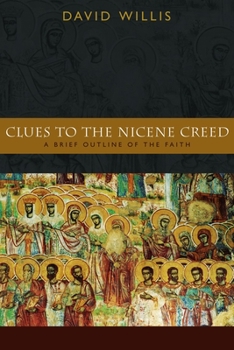Clues to the Nicene Creed: A Brief Outline of the Faith
This is a print on demand book and is therefore non- returnable. The Nicene Creed's powerful summary of Christian faith has stood the test of time, embodying core truths and distinguishing essential core truths and distinguishing essential Christian teachings from those of lesser importance. As respected thinker and educator David Willis explores the Nicene Creed in this new book, he provides clues for meaningfully interpreting this most ecumenical of church creeds in the twenty-first century. Writing especially for educated laypeople, advanced students, and theological educators, Willis eloquently links the ancient creed to life today. As he points out, faith is constantly taking different shapes within broad boundaries like the creed's statement of faith with analogies drawn from such diverse areas as architecture, graphic art, poetry, sculpture, and psychological theory. Those seeking to delve into the creed or to deepen a lifelong encounter with it will be enriched by Willis's reflections.
Format:Paperback
Language:English
ISBN:080282868X
ISBN13:9780802828682
Release Date:August 2005
Publisher:William B. Eerdmans Publishing Company
Length:200 Pages
Weight:0.40 lbs.
Dimensions:0.6" x 5.8" x 8.5"
Customer Reviews
1 rating
Credo
Published by Thriftbooks.com User , 19 years ago
When I was a seminary student, one of my assignments was to write a credo, a theological construction of what I believe. It seemed readily apparent to me that this would be related to the Nicene Creed, something I repeat each week as a summation of my belief. In the end, I took that creed line by line and worked my way through it with theological explanation. This book is similar in that regard - while it does not have a line-by-line structure, it does take the major themes of the Nicene Creed, perhaps the most commonly recited creed in Christendom, East or West, Catholic or Protestant. However, as I discovered when I set about writing my credo, the words we recite in worship, sometimes almost unconsciously as they have become so familiar, are not always readily apparent in meaning in all of their aspects. Willis writes, 'This book is for those who would like to be reminded of what they are standing for when they rectie the Nicene Creed and would welcome help in distinguishing the few essentials of the faith from the numerous matters of relative indifference.' We live in a time where there are many calls upon our faithfulness in different regards - women's ordination, sexual orientation, sacramental administration, and a host of other issues. Willis doesn't address these issues primarily, because they are not primary issues - the heart of Christianity is not in these details, but rather in the creed. Willis states that 'there is a sense of the truth of the creed that predates critical consciousness of its components.' Willis discounts the idea that one has to assent to the creed 'or else', resisting the idea that this is a magic formula by which one buys salvation, or alternately rejects and so is damned. He also strives to get to the heart of the matter, citing Calvin's ideas of freedom as including 'freedom to be indifferent about indifferent things.' As Willis traces the ideas through the creed, he discusses issues in current church practice as well as the historical development of the church, theologically and ecclesiastically. He looks particularly at baptism and communion at many points, as the sacramental expression akin to the creedal formulation of the faith. This is a worthwhile text for individual study or group study in a church or worship community. It is written assuming a familiarity with the church, but avoids intricate theological argumentation. There is an extensive bibliography (I was amused to see it entitled 'Mostly English Bibliography') and useful index. Willis' writing is clear, accessible, and helpful in terms of reflection and understanding that which many people do as a matter of course.





